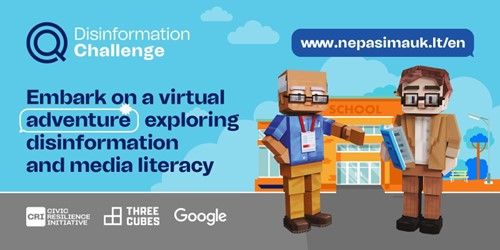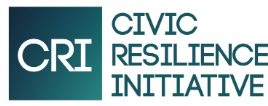"Disinformation Challenge " is a unique game based on the "Civic Resilience Initiative" and the "Three Cubes" project, with a focus on the Baltic countries. The project is supported by Google, which contributes to initiatives promoting digital literacy and information trust. The primary mission of the game is to help students identify sources of misinformation and develop their ability to critically evaluate online information. By focusing on open-access data, the game provides users with the tools to fact-check accurately and identify misleading sources.
The game is an educational tool designed for individual and school use targeting teenagers, particularly high school students aged 14–17 (grades 9–10). It is easily integrated into history or civics lessons, helping educators teach critical thinking in an engaging, interactive way. Its content has been developed in coordination with teachers, ministry representatives, and academics, making it easy to integrate into existing curricula. It helps not only young people but also the broader public understand the importance of critically analyzing online material. The game also encourages debate about the reliability of information and raises community awareness on this issue, thereby contributing to a more informed and resilient society.
The game develops project-based work skills, allowing students to work independently or collaboratively to solve problems. A specific exercise course has been developed to teach information verification techniques, using a platform similar to the popular game Minecraft. This gaming platform provides a unique educational environment where students can freely explore, while teachers have the ability to monitor their progress and interact with them through the platform as needed. The challenge takes place in a familiar setting - a high school - where students play as themselves in the game. In the scenario, students are called to the school auditorium, where an impostor posing as an expert proposes increasing the number of final exams required for graduation. Students are encouraged to analyze the expert's arguments using publicly available data and other methods for verifying information. Also, they are required to gather information from credible sources and utilize it to counter disinformation. Youth learn to critically evaluate various claims and develop effective responses based on accurate and reliable data. With support from Google, the game has been adapted to serve Baltic youth in their native languages, with an English version available for adaptation in other countries beyond the region. As more young people turn to social media for news and use these platforms as search tools, it becomes increasingly important to address the risks of encountering and spreading disinformation.
The methodology of the "Disinformation Challenge" game is based on practical tasks that encourage players to actively engage in verifying information. Through real-life examples, players learn to identify misleading information, analyze sources, and apply principles of critical thinking. In this way, they develop skills to navigate the world of information more efficiently and become resilient to disinformation attacks, which are particularly prevalent in today's geopolitical environment.
Modern school education for young people includes not only traditional teaching but also life skills, especially in evaluating information and critical thinking. This makes the interactive game "Disinformation Challenge" a valuable tool to help students develop essential skills for navigating the daily flow of information on the Internet. One of the main objectives of the game is to develop youth digital literacy, a crucial skill for the 21st century. Learning to identify misinformation enhances their ability to navigate the digital space and to critically assess what they see online. This skill becomes particularly important as students begin forming their own opinions about the world and gain greater independence in choosing information sources.
This game can also serve as a tool to promote social responsibility among teenagers. They learn not only to recognize false information but also to understand the importance of not spreading it. This builds the foundations of a responsible society, fostering future citizens who recognize their role in preventing the spread of misinformation. Interactive games such as the "Disinformation Challenge" help to spark youth interest and encourage active learning. Using a game as an educational tool allows young people to engage in a fun learning process while gaining valuable knowledge and skills. Innovative tools help students become more engaged in their learning and promote teamwork in collaborative tasks.
"Disinformation Challenge" has already been successfully used in various education and training programs helping students and young people develop critical thinking and information literacy. Educational institutions, youth centers, and NGOs can use the game as an innovative tool to stimulate discussions on misinformation and its impact on everyday information. The game provides participants with the opportunity to practice identifying misinformation and finding reliable sources, all while learning in an interactive and enjoyable way.

